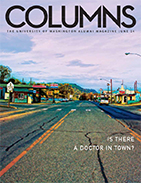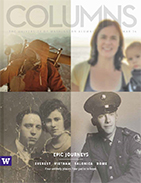Search
Current Search Filters
June 2014 issue
Laura Pavlou, ’06, gives women behind bars a boost
When Laura Pavlou visits Gig Harbor’s Washington Corrections Center for Women, she sees hope and vitality. Behind the steel gates of the maximum-security prison, it is her mission to nurture potential.
June 2014 issue
Editor’s Eye: Let the innovation commence
You have to be bold to be an innovator. You have to have confidence. You have to take a chance. And who better to face that head-on than the thousands of students who will be marching into Husky Stadium on June 14 for Commencement.
June 2014 issue
Eyewitness to a typhoon’s devastation
Lauren Pongan, a graduate student in Southeast Asia Studies, traveled to Tanauan, Leyte, last December, not long after Typhoon Yolanda devastated portions of the Philippines.
June 2014 issue
Life guard: Cancer-fighting alumnus earns UW’s top alumni award
Art Levinson, the driving force behind several cancer-fighting drugs, is the 2014 Alumnus Summa Laude Dignatus, the highest award bestowed upon UW alumni.
June 2014 issue
Technology could prevent ‘liquid facelifts’ from going wrong
Millions of people each year remove wrinkles, soften creases and plump up their lips by having a physician inject a gel-like material into their facial tissue. These cosmetic procedures are sometimes called “liquid facelifts” and are said to be minimally invasive. It’s rare, but sometimes things go wrong.
June 2014 issue
UW astronomer part of bonanza of planetary discoveries
University of Washington astronomer Eric Agol played a key role in the discovery of 715 new exoplanets announced by NASA Feb. 26. Agol was on a team that found seven of those worlds, all in orbit around the same star, Kepler-90.
June 2014 issue
Robot observers will staff digital ocean lab
This fall the UW will complete installation of a massive digital ocean observatory. Dozens of instruments will connect to power and Internet cables on the sea floor, but the observatory also includes a new generation of ocean explorers: robots that will zoom up and down through almost two miles of ocean to monitor the water conditions and marine life above.
June 2014 issue
Mobile technology could help solve Africans’ breastfeeding dilemma
A collaboration between UW Computer Science and Engineering and PATH, a Seattle-area non-governmental organization, has led to a simple, ingenious solution to a dilemma facing women in Sub-Saharan Africa who wish to store breast milk. While medical care and safe water are not always available, most Africans today have smartphones.
March 2014 issue
Sally Skinner Behnke, 1923-2013
Sally Skinner Behnke, who died Dec. 12 at age 90, made a huge difference in the Seattle community—and to the UW.
March 2014 issue
Burke Museum curator is a bridge to an ancient world
A trip in 1988 ignited Sven Haakanson's passion for preserving indigenous culture. Now he's the new Curator of Native American Anthropology at the Burke Museum of Natural History.
March 2014 issue
Nurse extends a helping hand far beyond the hospital
Ekene “Kennie” Amaefule is a former Nurse of the Year at Harborview Medical Center who has single-handedly improved health care, education, social services and access to clean water in her native village of Imo State, Nigeria.
March 2014 issue
Husky Ballpark promises to be a big hit
In the shadow of gleaming Husky Stadium, construction continues on another remodeled athletic facility, one that is arguably an even more dramatic upgrade.
March 2014 issue
Theory explains how Mars could have once been warm and wet
The mystery of how the surface of Mars, long dead and dry, could have flowed with water billions of years ago may have been solved by research that included a University of Washington astronomer.
March 2014 issue
Brain could play a key role in diabetes
A growing body of evidence suggests that the brain plays a key role in glucose regulation and the development of type 2 diabetes.
March 2014 issue
Debra Friedman, 1955–2014
Debra Friedman loved the University of Washington. She earned two degrees here, served as a UW faculty member and administrator from 1994 to 2005, and in 2011, became chancellor of UW Tacoma—a job she threw herself into.
March 2014 issue
Jack R. MacDonald, 1915–2013
When Jack R. MacDonald died Sept. 13 at age 98, a $187.6 million charitable trust was provided for three of this favorite causes in Western Washington: the UW School of Law, Seattle Children’s Research Institute and The Salvation Army’s Northwest Division.
March 2014 issue
Danger and adventure call UW thrill seekers to the mountains
Mountain climbing has drawn many a UW student, parent, graduate, staff and faculty member up into the rarified air. Here, we highlight a few of those bold, strong and determined enough to push the limits.
March 2014 issue
Second code found hiding in DNA
Researchers led by Dr. John Stamatoyannopoulos have discovered a second code hiding within DNA. This second code contains information that changes how scientists read the instructions contained in DNA and interpret mutations to make sense of health and disease.
March 2014 issue
Sephardic language and culture tether professor to his family’s history
By reviving a language on the brink of extinction, a history professor preserves the memory of family members who died in the Holocaust.
March 2014 issue
Author Teresa Tamura, ’96, captures snapshots of Japanese internment
Teresa Tamura captures poignant stories of hardship from a World War II relocation center in her book "Minidoka: An American Concentration Camp."

